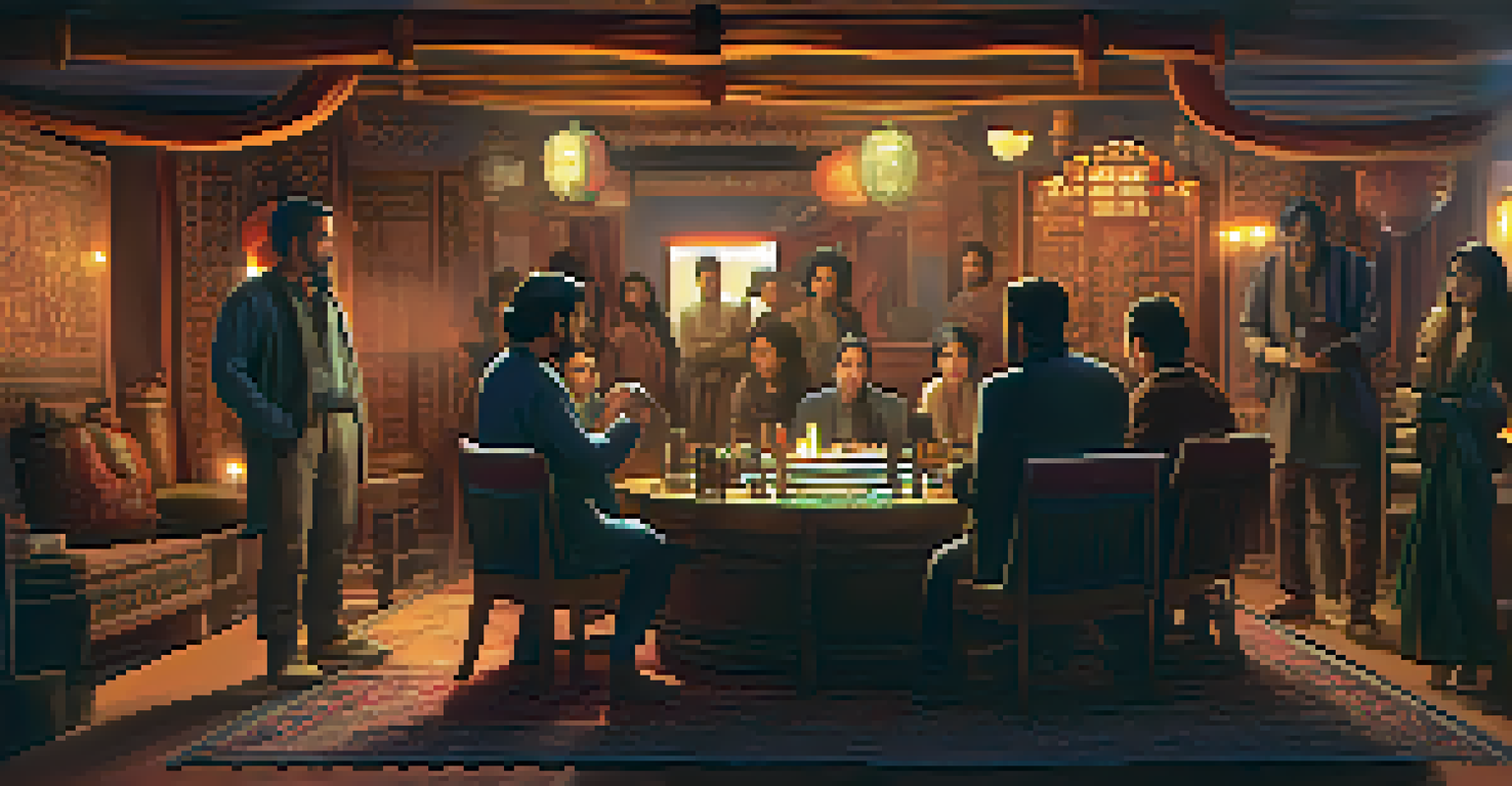Globalization's Role in Shaping Modern Cinema Narratives

Defining Globalization in the Context of Cinema
Globalization refers to the interconnectedness of cultures and economies across the world. In cinema, this means that stories, themes, and characters are influenced by a wide range of cultural backgrounds. The blending of different cultural narratives creates a rich tapestry that reflects our global society, making films more relatable and diverse.
Cinema is a mirror by which we can see ourselves and each other, reflecting the diversity of the human experience.
As films cross borders, they often incorporate elements from multiple cultures, which can lead to a deeper understanding among audiences. For example, a Hollywood film might include a subplot featuring Asian characters, showcasing traditions that resonate with both Western and Eastern viewers. This cross-cultural exchange enriches storytelling and expands the audience's perspective.
Moreover, globalization allows filmmakers to tap into international markets, leading to a broader range of narratives. This shift is evident in the rise of foreign films gaining popularity in mainstream cinema, demonstrating the audience's appetite for diverse stories. Consequently, global influences continue to shape modern cinema in ways that are both innovative and exciting.
Cultural Exchange and the Evolution of Storytelling
One of the most significant impacts of globalization is the cultural exchange that occurs through film. Filmmakers are now influenced by various storytelling traditions, leading to new narrative techniques and styles. This blending of cultural elements results in films that are not only entertaining but also thought-provoking.

For instance, the incorporation of Bollywood dance sequences into Western films highlights how different cinematic styles can enhance storytelling. Such practices showcase the growing influence of diverse cultures in mainstream narratives, making them more vibrant and relatable. This evolution encourages filmmakers to experiment and push the boundaries of traditional storytelling.
Globalization Enriches Cinema's Narrative
Globalization allows filmmakers to blend diverse cultural elements, resulting in richer and more relatable storytelling.
Additionally, the rise of streaming platforms has made it easier for audiences to access international films, further encouraging cultural exchange. As viewers explore stories from around the world, they develop a greater appreciation for different perspectives. This shift not only broadens the audience's horizons but also inspires filmmakers to create more inclusive narratives.
The Role of Technology in Global Film Production
Advancements in technology have played a crucial role in globalization, particularly in film production. Digital tools and platforms enable filmmakers from various countries to collaborate seamlessly, regardless of geographical barriers. This interconnectedness allows for the sharing of ideas, resources, and talent across borders.
The power of cinema is its ability to transcend borders and connect people through shared stories and experiences.
For example, films like 'Crouching Tiger, Hidden Dragon' showcase the successful collaboration between Eastern and Western filmmakers, resulting in a unique cinematic experience. Such partnerships often lead to innovative storytelling techniques that can resonate with a global audience. The blending of different filmmaking styles enriches the overall narrative and aesthetic of the film.
Moreover, the rise of social media has transformed how films are marketed and distributed worldwide. Filmmakers can now reach international audiences directly, fostering a sense of community among fans. This accessibility not only helps promote diverse stories but also encourages dialogue about the themes and messages portrayed in modern cinema.
Diversity in Characters and Plotlines
Globalization has led to an increasing demand for diverse characters and plotlines in modern cinema. Audiences are more inclined to support films that reflect a variety of cultures, experiences, and identities. This shift is evident in the growing number of films that feature underrepresented groups, highlighting their stories and perspectives.
For instance, films like 'Black Panther' and 'Crazy Rich Asians' have made significant strides in showcasing diverse narratives. These films not only celebrate cultural heritage but also challenge stereotypes, offering audiences a fresh take on familiar genres. By prioritizing diversity, filmmakers can create authentic stories that resonate with a broader audience.
Diversity Drives Modern Film Demand
Audiences increasingly seek films that reflect a variety of cultures and identities, leading to more inclusive narratives.
Additionally, the inclusion of diverse characters enriches the narrative landscape, allowing for a more nuanced exploration of themes such as identity, belonging, and social issues. As filmmakers embrace globalization, they have the opportunity to tell compelling stories that reflect the complexities of our modern world.
Addressing Global Issues Through Film
Modern cinema often tackles pressing global issues, reflecting the interconnected nature of our society. Topics such as climate change, migration, and social justice are increasingly prevalent in films, encouraging audiences to engage with these critical conversations. By addressing global challenges, filmmakers can inspire change and foster awareness among viewers.
For instance, documentaries like 'Before the Flood' and narrative films like 'The Kite Runner' shed light on important social issues, prompting audiences to consider their impact. These films serve as a catalyst for discussions around responsibility and action, emphasizing the role of cinema as a powerful medium for social commentary.
Furthermore, as filmmakers draw from a wealth of international perspectives, they can present multifaceted narratives that resonate with audiences globally. This approach not only educates viewers about different cultures but also highlights our shared human experiences, fostering empathy and understanding in an increasingly divided world.
Globalization's Influence on Film Genres
The influence of globalization extends to various film genres, leading to the emergence of hybrid styles that blend different cultural elements. For example, the rise of action films featuring martial arts, such as 'The Matrix,' showcases how global influences can create unique cinematic experiences. This blending of genres not only captivates audiences but also pushes the creative boundaries of filmmaking.
Moreover, the incorporation of diverse cultural elements into established genres encourages innovation. Filmmakers are now experimenting with genres like horror, comedy, and drama, infusing them with global themes and narratives. This evolution allows for a richer exploration of human experiences, making films more relatable to a wider audience.
Technology Enhances Global Collaboration
Advancements in technology facilitate collaboration among filmmakers worldwide, promoting innovative storytelling across borders.
As a result, modern cinema continues to evolve, reflecting the dynamic nature of our global society. By embracing globalization, filmmakers can create fresh and engaging narratives that resonate with audiences from all walks of life, ultimately redefining the landscape of film genres.
The Future of Cinema in a Globalized World
As we look ahead, the future of cinema is undoubtedly influenced by globalization. With technology continuing to advance and audiences becoming more diverse, filmmakers have an incredible opportunity to explore new narratives. The potential for collaboration across cultures is immense, paving the way for innovative storytelling that transcends borders.
Additionally, as global issues become more pressing, cinema will likely continue to serve as a platform for dialogue and awareness. Filmmakers who embrace diverse perspectives will not only attract a broader audience but also contribute to meaningful conversations about our shared humanity. This trend signals a promising future for cinema that remains relevant and impactful.

Ultimately, globalization is reshaping modern cinema narratives, encouraging filmmakers to tell stories that reflect the complexities of our world. By embracing this interconnectedness, we can look forward to a cinematic landscape that celebrates diversity, fosters understanding, and inspires change for generations to come.